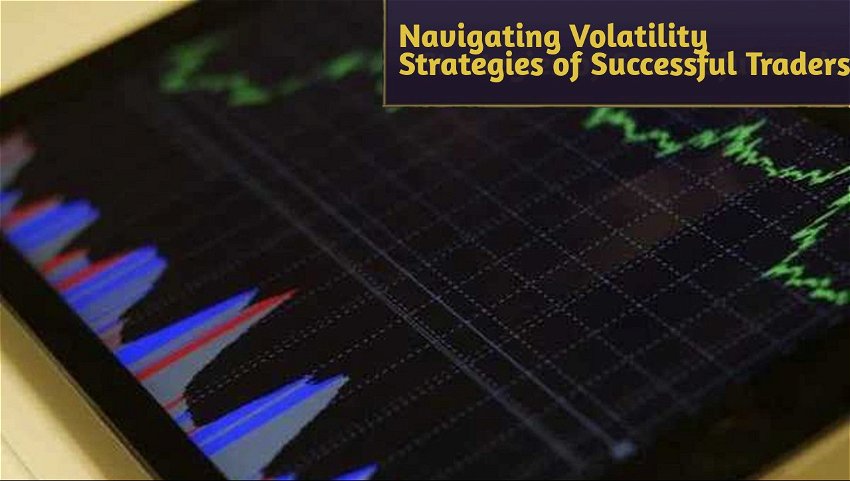Volatility is an omnipresent force that can either make or break traders.
It's akin to navigating stormy seas, where sharp price fluctuations can either offer lucrative opportunities or lead to substantial losses.
Successful traders have honed their skills to not only survive but thrive in volatile market conditions.
In this article, we'll delve into the strategies employed by seasoned traders to navigate volatility effectively, ensuring the preservation of capital and the pursuit of profits.
Understanding Volatility
Volatility, simply put, is the degree of variation in the price of a financial instrument over time.
It's a measure of uncertainty, reflecting the market's propensity for rapid and unpredictable price movements.
Volatility can stem from various factors, including economic indicators, geopolitical events, market sentiment, and even unexpected news.
Understanding the dynamics of volatility is paramount for individual trades, as it influences risk management decisions and trading strategies.
Importance of Navigating Volatility
Navigating volatility isn't just a matter of survival; it's a prerequisite for success in the world of trading.
Volatility presents both opportunities and challenges, and adept traders leverage it to their advantage.
By adeptly maneuvering through volatile market conditions, traders can capitalize on price swings, exploit trading opportunities, and mitigate risks effectively.
Moreover, mastering volatility instills confidence and resilience, enabling traders to weather market storms with composure and poise.
Overview of Successful Trading Strategies
Successful traders employ a diverse array of strategies to navigate volatility with finesse. These strategies encompass risk management, market analysis, emotional discipline, and continuous learning.
Let's explore these strategies in detail.
1. Risk Management: Protecting Your Capital
Effective risk management lies at the core of successful trading. It's about safeguarding your capital and managing losses prudently. Here are some key risk management strategies:
• Setting Stop-Loss Orders: It is a price level where a trader exits a trade that is losing to limit potential losses.
• Proper Position Sizing: Determining the appropriate position size based on risk tolerance and market conditions to avoid overexposure.
• Diversification: Spreading investments across different asset classes and markets to reduce concentration risk.
2. Adapting to Market Conditions
Adaptability is a hallmark of successful traders. They possess the agility to adjust their strategies in response to changing market dynamics. Here's how they do it:
• Recognizing Different Types of Volatility: Understanding the underlying drivers of volatility and distinguishing between normal market fluctuations and significant price movements.
• Utilizing Technical Analysis Tools: Employing technical indicators, chart patterns, and trend analysis to identify potential entry and exit points.
• Staying Informed About Market News: Keeping abreast of economic events, corporate earnings reports, and geopolitical developments that can impact market sentiment.
3. Patience and Discipline
Patience and discipline are virtues that separate successful traders from the rest. They adhere to a structured approach and avoid impulsive decision-making.
Here's how they exercise patience and discipline:
• Avoiding Emotional Trading: Emotions like fear and greed can cloud judgment. Successful traders remain calm and rational, sticking to their trading plans.
• Having a Long-Term Perspective: They understand that trading is a marathon, not a sprint, and focus on consistent, sustainable returns over time.
• Following a Trading Plan: Creating a well-defined trading plan that outlines entry and exit criteria, risk management rules, and overall trading objectives.
4. Continuous Learning and Improvement
The pursuit of knowledge is perpetual in the world of trading. Successful traders are committed to lifelong learning and self-improvement.
Here's how they stay ahead of the curve:
Reviewing Past Trades: Analyzing for Insights
Traders meticulously dissect their past trades, examining each transaction for valuable insights.
By scrutinizing past successes and failures, they identify recurring patterns, strengths to capitalize on, and areas that warrant improvement.
This introspective process not only enhances decision-making but also fosters a deeper understanding of market dynamics.
Keeping Up with Market Trends: Embracing Change
Market trends are akin to shifting currents in an ocean—dynamic, unpredictable, and ever-changing.
Successful traders remain attuned to these fluctuations by diligently monitoring evolving market trends, technological advancements, and regulatory changes.
Through continuous research, data analysis, and educational pursuits, they equip themselves with the knowledge needed to effectively navigate the complexities of the financial landscape.
Seeking Mentorship and Guidance: Learning from the Masters
Learning from the experiences of seasoned traders is invaluable in the journey toward mastery.
Successful traders actively seek mentorship and guidance from industry veterans, experienced mentors, and subject matter experts.
By tapping into the wisdom of those who have walked the path before them, they gain invaluable insights, practical strategies, and perspectives that accelerate their growth and development.
Conclusion
Navigating volatility is both an art and a science. Successful traders possess a unique blend of skills, discipline, and resilience that enable them to thrive in the face of uncertainty.
By mastering risk management, adapting to market conditions, exercising patience and discipline, and committing to continuous learning, traders can tilt the odds of success in their favor.
Remember, volatility isn't a hindrance—it's an opportunity for those who are prepared to seize it.










— Comentarios 0
, Reacciones 1
Se el primero en comentar